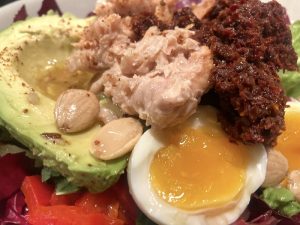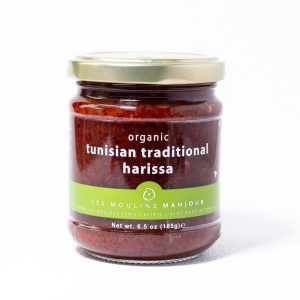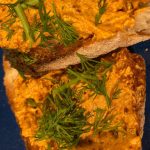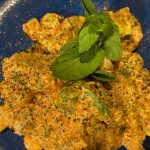Excerpt from Ari’s Top 5 enews
Savor by the Light of the Winter Moon
 I was emailing this past week with my long-time Tunisian friend Majid Mahjoub. He and his family are, without question, following their soul’s calling; everything about their work—the quality of the products, the design of the labels, their dedication to Tunisian tradition—is inspiring. I love all the amazing traditional Tunisian products we get from the Mahjoubs; I love the way they do business and their commitment to their community and to their country. I also love Majid and his family!
I was emailing this past week with my long-time Tunisian friend Majid Mahjoub. He and his family are, without question, following their soul’s calling; everything about their work—the quality of the products, the design of the labels, their dedication to Tunisian tradition—is inspiring. I love all the amazing traditional Tunisian products we get from the Mahjoubs; I love the way they do business and their commitment to their community and to their country. I also love Majid and his family!
We have many shared values around people, food, cooking, and collaboration. Chatting back and forth with Majid online inspired me to put a couple of the Mahjoub’s products to work in this simple-to-make, but complexly flavored, salad. Start with a bowl of sturdy salad greens—romaine would work well, as will escarole. Fill one bowl for each person about a third of the way, then add the same amount of fresh radicchio—I’m a big fan of its fresh bitter flavor. Add a LOT of fresh herbs, most especially fresh mint. Basil is terrific, as are parsley, dill, thyme, or tarragon—the herbs are one of the things that make the salad, so a good handful chopped for each bowl would be ideal. Sprinkle on a small bit of sea salt. On top of the bowl add some great tuna (one of Majid’s favorite foods), a boiled egg, and some toasted almonds. Finely chop some of the Mahjoub’s preserved lemon and add that to the salad as well. (The lemons are naturally cured for six months in salt brine and there’s something really special about the flavor. In a pinch, you can also just use lemon juice.) Drizzle on a little wine vinegar, like the Pofi vinegar I wrote about a few weeks ago, and a generous dose of extra virgin olive oil. We have long used the Mahjoub’s oil as our “house oil”—we buy it in three-liter tins, and we love it. It’s made solely—and soulfully—with olives taken from the Mahjoub’s own organically grown trees. The oil is finished using the ancient French method called the “feuille”—when olives are pressed, you get a mix of oil, water, and pomace. In this old method, a leaf-shaped metal utensil is used to carefully hand skim the oil off the top of the water.
 Last but definitely not least, spoon on a bunch of the Mahjoub’s traditional spicy harissa. It is both marvelous and magical! Again, it’s made with ingredients that all come from the family farm—three different peppers, all sun-dried; tomatoes, also sun-dried (the sun-drying makes a big difference); spices; and Mahjoub’s olive oil—all blended together in a thick paste. Here I’m putting it on the salad, but it’s terrific on pretty much anything, such as hot couscous or pasta. Serve with fish or meat. Great for steaks or burgers. Beautiful spread on a sandwich or added to egg salad. It’s hard to go wrong.
Last but definitely not least, spoon on a bunch of the Mahjoub’s traditional spicy harissa. It is both marvelous and magical! Again, it’s made with ingredients that all come from the family farm—three different peppers, all sun-dried; tomatoes, also sun-dried (the sun-drying makes a big difference); spices; and Mahjoub’s olive oil—all blended together in a thick paste. Here I’m putting it on the salad, but it’s terrific on pretty much anything, such as hot couscous or pasta. Serve with fish or meat. Great for steaks or burgers. Beautiful spread on a sandwich or added to egg salad. It’s hard to go wrong.
The colors of the salad put beauty on your table. The deep purple of the radicchio, the green of the lettuce, the orange and white of the egg, the yellow of the lemon, the pink/tan-colored tuna, and the vermillion of the harissa will brighten even the darkest winter evening! While he’s not from Tunisia, the bright colors of the salad and the generous, soulful, spirit of the Mahjoubs make me think about these lines from Kurdish poet Behrouz Boochani:
When the moon is full it practices colour-blending on the layers of thick cloud like a watercolour painter:
An assembly of sorcerous colours/
Yellow, orange and red/
Talisman … /
Offerings … /
Gifts from each night.

> Shop Majoub producees at the Deli for PICKUP OR ANN ARBOR DELIVERY



